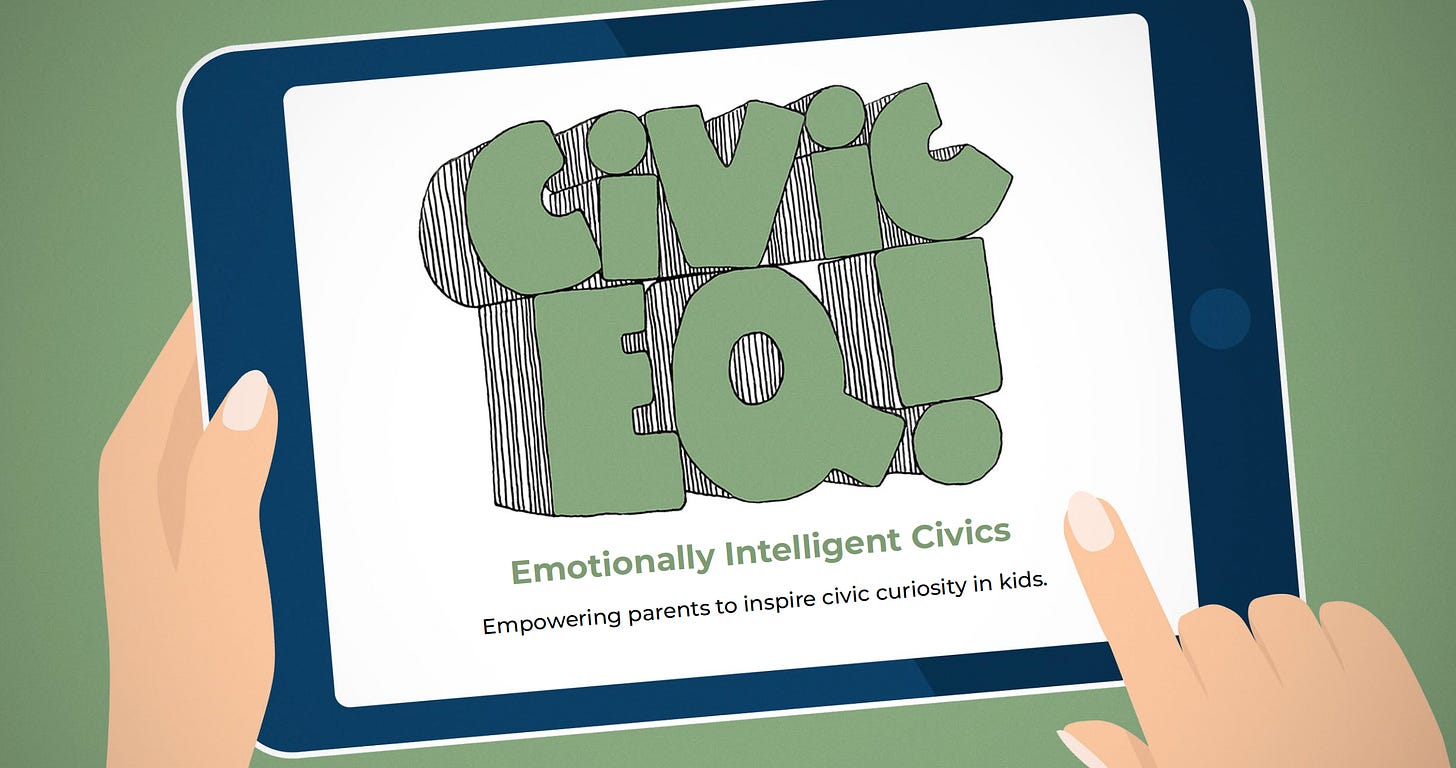Time Magazine Calls 2024 "The Year of Democracy"
Also: Introducing the High-Calorie Civic Snack of the Week
Thanks to
, there’s been an influx of new subscribers in the past couple of weeks. Welcome!! I’m an entertainment lawyer, writer and mom to a 22 month old named Gus. I’ve been living in Los Angeles for the last two years but consider New York my home.If you’re new, Civic EQ is for parents who want to brush up on civics in an emotionally intelligent way.
For more about why I started Civic EQ, check out The Reason I’m Here.
I spent the last 10 years writing a children’s book about civic friendship. Along the way, I realized how much I’d forgotten about civics, and becoming a parent made me want to do something about it in a meaningful way.
Being the earnest, information-driven generation that we are, I created Civic EQ with three core beliefs:
Parenthood is a unifying experience.
Education is transformative at all ages.
The best version of “civics” is inherently socially and emotionally rich.
In the short term, my goal is to help parents navigate the complexities of the upcoming election with hope, positivity and even a touch of humor.
In the long term, I’m committed to changing the narrative about our generation being the least informed, so we can raise the most engaged generation yet.
Back to it.
2024: The Biggest Election Year in History
TIME magazine calls 2024 “The Year of Democracy”.
writes one of my favorite Substacks. She can break down complex legal proceedings like no one else can. Joyce ends most of her posts with “We’re in this together”, and honestly, we really are.In fact, the majority of the world is in it together.
Did you know that 2024 is the biggest worldwide election year in history?
4.2 billion people — more than half the worldwide population — will vote in nationwide elections. India, the world’s largest democracy, has over 900 million registered voters. Mexico, Russia, Iran, South Africa and the EU are all holding nationwide elections.
It’s easy to get caught up in our own political and social milieu, but the repetitive soundbites and headlines we’ve been taking a bath in since 2016 aren’t unique to us.
In fact, “of the 43 countries expected to hold free and fair elections this electoral megacycle, 28 do not actually meet the essential conditions for a democratic vote, according to the Democracy Index from the Economist’s Intelligence Unit. And eight of the 10 most populous countries in the world, including India, Mexico, and the U.S.—all of which head to the polls this year—are grappling with the challenge of ensuring voter participation, free speech, and electoral independence while authoritarianism is on the rise.” (TIME Magazine, “A Make-or-Break Year for Democracy Worldwide”)
High-Calorie Civic Snack of the Week
I’m starting a new weekly section inspired by Kendall Roy where I share things I’m watching, listening to or reading in my lifelong pursuit of civic self-optimization (see my post Civic Dystopia for a resounding endorsement of going back into the HBO vault and streaming John Adams).
Most of the suggestions will be for parents, but there will also be some high-calorie civic snacks you can give to your kids.
This week’s is a documentary series coming out Monday night on Max. I find that most documentaries are a trojan horse for civic education. It’s impossible to watch a true crime doc and not come away knowing more about the criminal justice system. Cult docs frame social issues through the lens of history. For the most part, any good documentary touches on civics in some foundational way.
Last week I screened the first episode of a client’s HBO documentary series THE SYNANON FIX, streaming April 1 on Max.
I don’t typically watch cult documentaries and I hadn’t heard of Synanon before I watched it, but I know cult docs are a fan favorite and this one is excellent. Synanon was a rehab center that became a cultural phenomenon before it was seen as a cult. Its early ideas were radical in the 1950s, when society had largely embraced Alcoholics Anonymous but villainized drug addicts rather than believing they could be treated.
Synanon propagated a culture of recovery that threaded ideas like community, shared experience and tough love. The founder is credited with having brought the self-help mantra “today is the first day of the rest of your life” into the mainstream.
Synanon’s ascent and devolution is fascinating. At its height, the membership was mostly comprised of people whose only nexus was a belief in Synanon’s ideals of shared resources and community above all else.
The political and countercultural backdrop of the 1960s is as much a part of the story as the chronic desire for connection and community. It’s very much a reminder of the basic human longing for togetherness. Civics at its finest.
Thanks for reading and more soon,
Sarah




